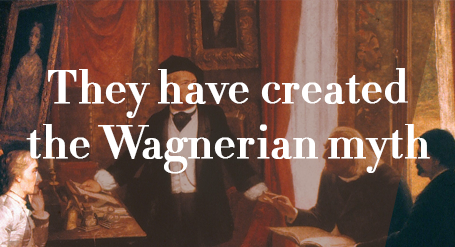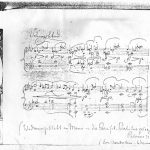
If Wagner was the cultural and musical chronicler of his time, if he remained a revolutionary activist, he had also gone into the act of police, and if he was finally his master of Bayreuth celebrated as the one of the major artist of his At the time, the illustrious composer did not live before a man made of chair and blood, animated by passions, with a sometimes violent, sometimes facetious, and sometimes tender character.

THOSE RELATED ARTICLES MAY
INTEREST YOU
 YEAR 1883
YEAR 1883
During the first days of 1883, Richard Wagner learned the invention of the phonograph, this news the unworthy as it saddened. February 6, 1883 (Mardi Gras Evening) The Carnival is in full swing and the Wagners are St. Mark’s Square where they see the procession of Prince Carnival (Read More)
 ELEGY WWV93
ELEGY WWV93
This fragmentary work (album sheet) in A flat major seems to have been written by Wagner in 1869. This page was long considered a late work (see the last notes he drew in Venice before his death in 1883). Wagner played it said the day before his death. (Read more)
 TRISTAN AND ISOLDE
TRISTAN AND ISOLDE
Richard Wagner’s seventh opera, Tristan and Isolde (WWV 90) is the fourth in the so-called period of maturity of the composer and the first created under the patronage of King Ludwig II of Bavaria. It is also the only work resulting from an order in the career of the composer: March 9, 1857, (Read more)
WAGNER Carl Friedrich
(18. June 1770 – 23. November 1813)
Husband of Johanna Rosine PÄTZ and Richard Wagner’s father
Carl Friedrich Wilhelm was born on 18 June, 1770 – the same year as Beethoven – in Leipzig. Richard’s grandfather, Gottlob Friedrich Wagner (1736-1795), born in Müglenz, studied theology at Leipzig University, then, having failed, became a tax collector just outside of the Ranstadt. He married in 1769 Johanna Sophie Eichel, daughter of a teacher from Leipzig. They had four children: the first died in infancy, then Adolf [1], Friedrich and Friederike. Richard’s father attended St Thomas school starting from December 1780 and joined nine years later the university of the Saxon city. After studying law, in 1794 he became a jurist and deputy clerk at the Court of Justice of the City of Leipzig. It was not until 1810 that he obtained the position of clerk at the police directorate, thanks to his knowledge of the French language [2] and the support of Marshal Davout [3].
Richard tells us in his autobiography (Mein Leben): « He was very fond of poetry and literature, and was particularly interested in theatre[4] ». Thus, he named his daughters by taking inspiration from the heroines of Goethe and Schiller and gave them a very good education. He himself appeared with some success in a play (comedy) by Goethe, Die Mitschuldigen (The Accomplices). This passion also expressed itself in the form of courteous ardours for the actresses of theatre.
Friedrich assiduously went out with a celebrity of the time. His meetings were numerous enough for his wife to have still complained about it to her children, jokingly. The couple thus led a somewhat fanciful life. Hoffmann, then conductor at the New Theatre in Leipzig, met Friedrich on 17 June, 1813. « An exotic man [5], » wrote the author in his Diary. We have no portrait of him. According to the testimony of a friend of Albert Wagner’s daughters (Richard’s elder brother), received in the 1890s, the man was « small and bent, but with a beautiful face [6]. »
Excerpt from ![]() “Richard Wagner’s parents” by Pascal Boutedja
“Richard Wagner’s parents” by Pascal Boutedja
[1] The uncle that Richard talks about with so much warmth in his autobiography and for which he nurses the most lively admiration. Adolf was a renowned and respected academic, who trained notably in Jena and Dresden, a theologian, a philologist and a man of letters at once. This uncle would play a decisive role in the general education and literary training of young Richard.
[2] How Friedrich learned French is still a mystery.
[3] Ernest Newman, The Life of Richard Wagner. 1.1813-1848. London, Cambridge University Press,1976.
[4] Richard Wagner, My Life. Paris, Buchet/Chastel, 1978, p. 13.
[5] Herbert Barth, Wagner. A documentary study. Paris, Gallimard, 1976, p. 147.
[6] Mary Burrell, Richard Wagner. His Life and Works from 1813 to 1834. Thalwil (Suisse), Editions TIMO Verlag, s.d., p. xv.
If you wish to share further information about this article, please feel free to contact us !